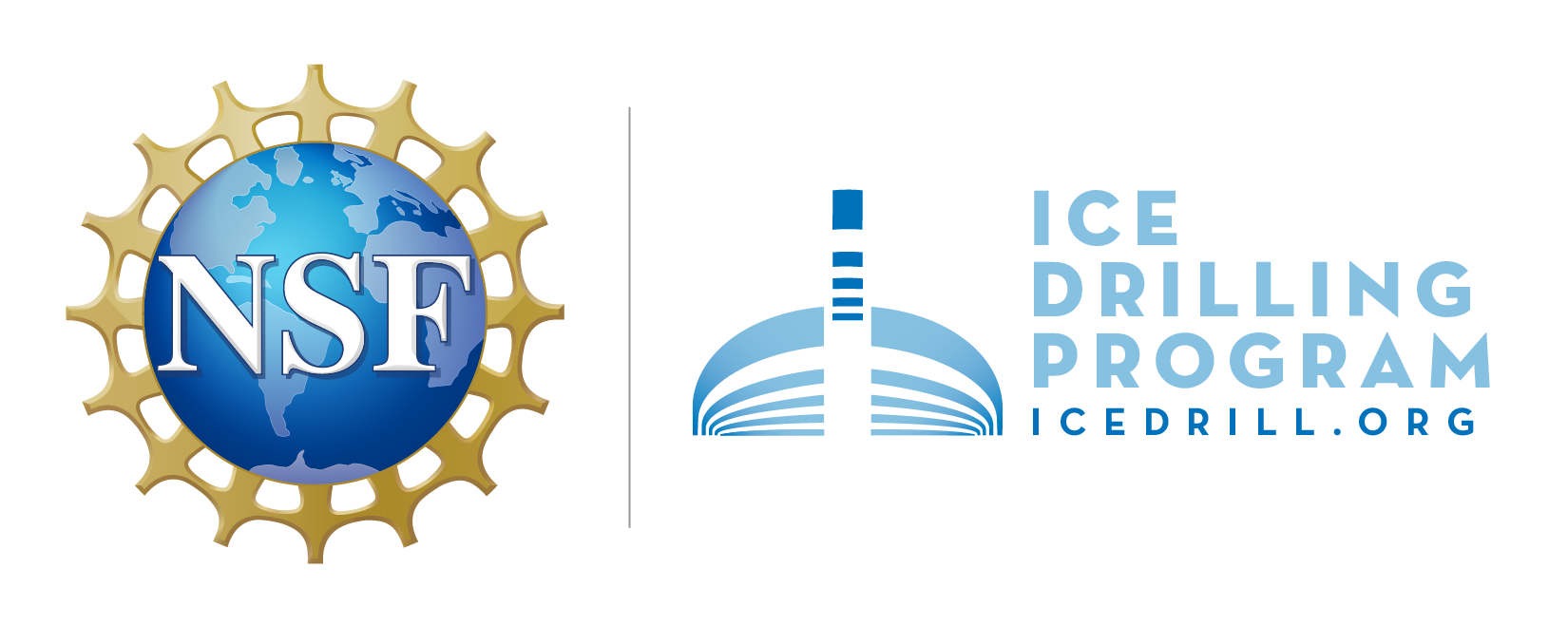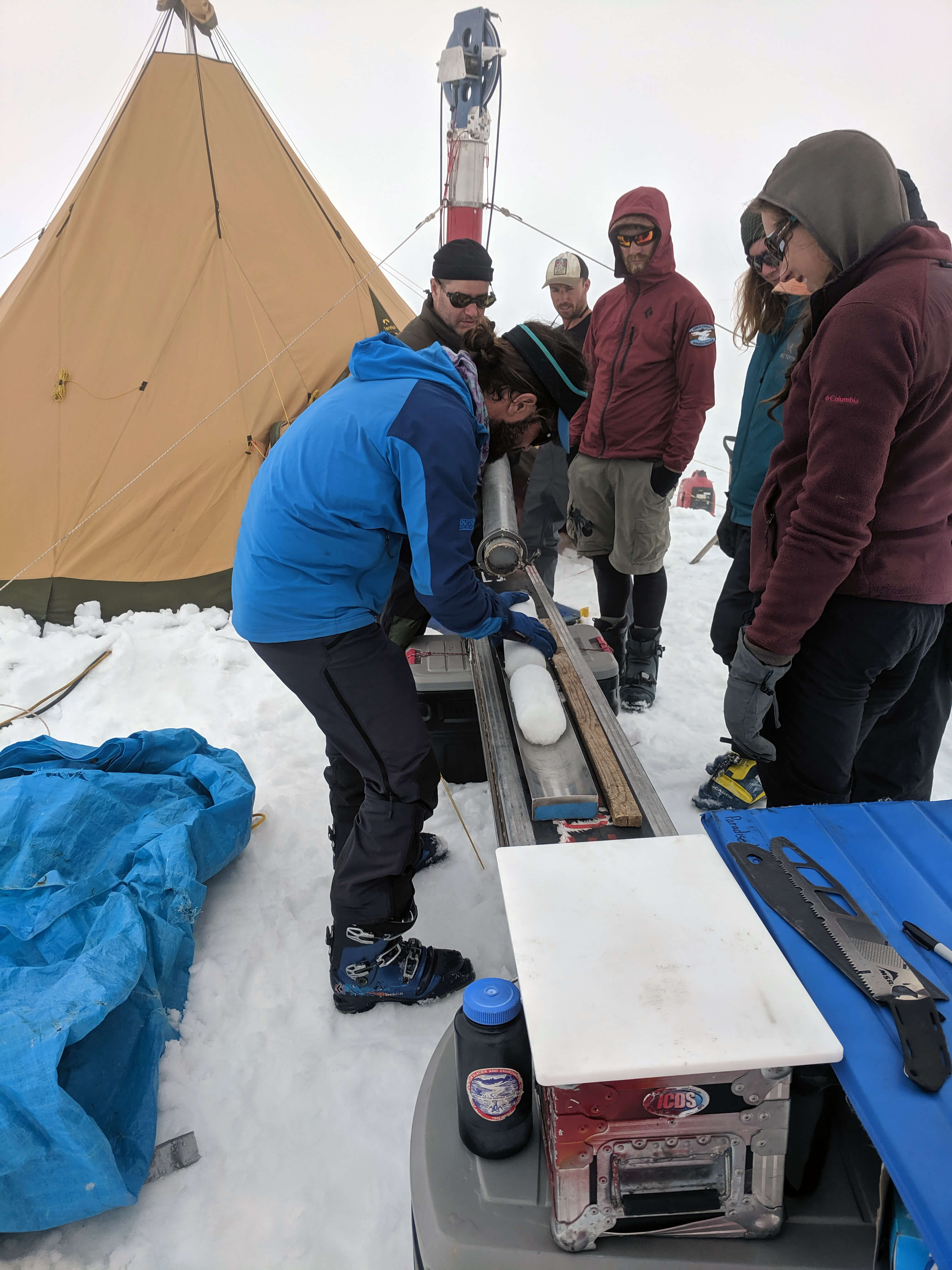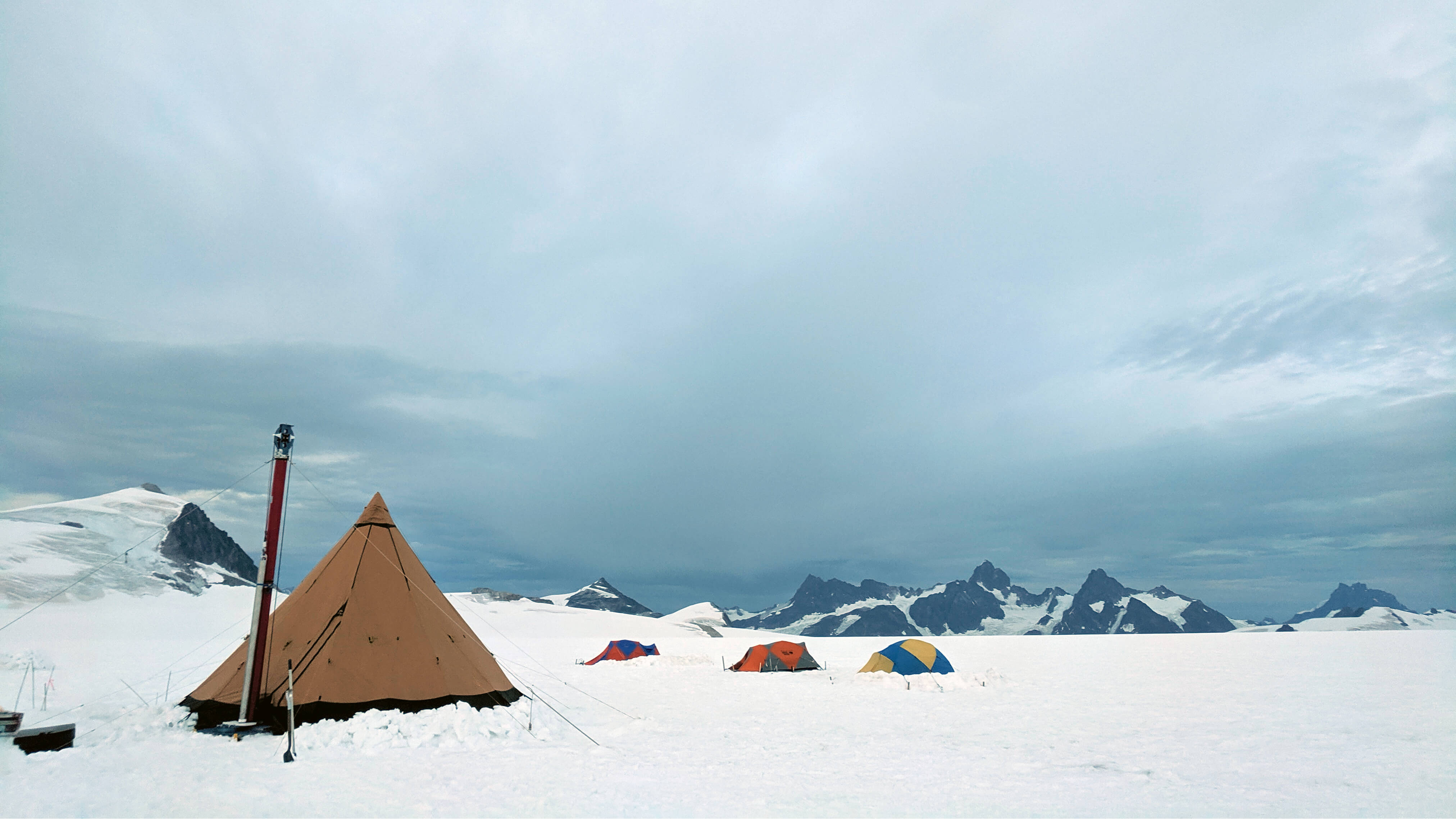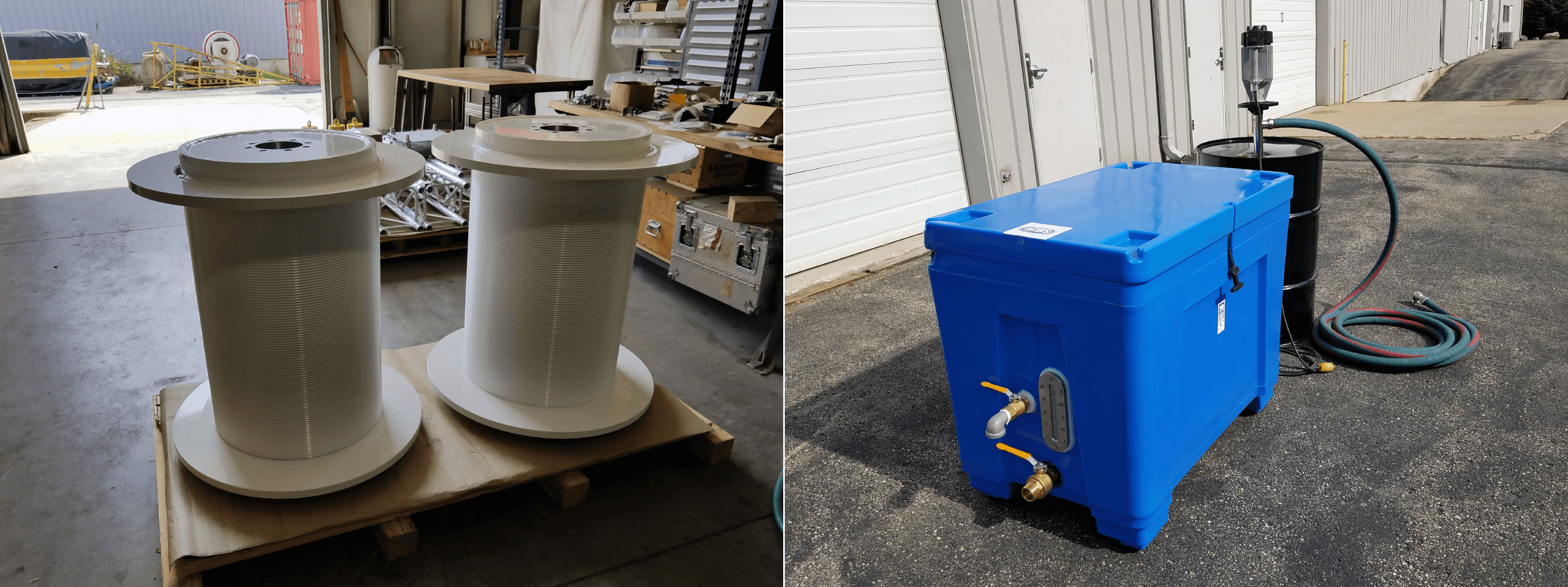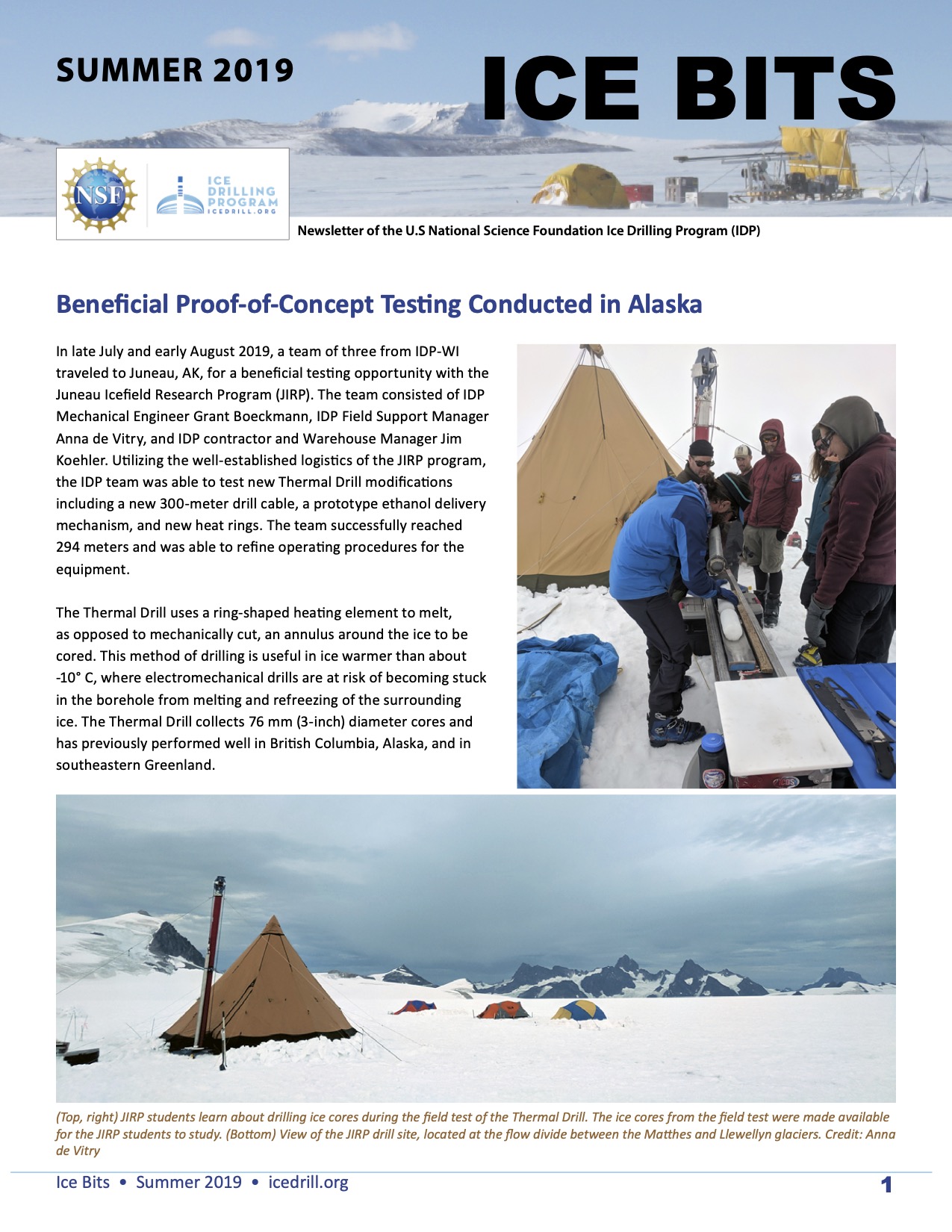Beneficial Proof-of-Concept Testing Conducted in Alaska
- Thermal Drill
In late July and early August 2019, a team of three from IDP-WI traveled to Juneau, AK, for a beneficial testing opportunity with the Juneau Icefield Research Program (JIRP). The team consisted of IDP Mechanical Engineer Grant Boeckmann, IDP Field Support Manager Anna de Vitry, and IDP contractor and Warehouse Manager Jim Koehler. Utilizing the well-established logistics of the JIRP program, the IDP team was able to test new Thermal Drill modifications including a new 300-meter drill cable, a prototype ethanol delivery mechanism, and new heat rings. The team successfully reached 294 meters and was able to refine operating procedures for the equipment.
The Thermal Drill uses a ring-shaped heating element to melt, as opposed to mechanically cut, an annulus around the ice to be cored. This method of drilling is useful in ice warmer than about -10° C, where electromechanical drills are at risk of becoming stuck in the borehole from melting and refreezing of the surrounding ice. The Thermal Drill collects 76 mm (3-inch) diameter cores and has previously performed well in British Columbia, Alaska, and in southeastern Greenland.
Foro 3000 Fabrication Underway
- Foro 3000 Drill
Following completion of the Foro 3000 detailed design and external reviews held in late PY 2018, IDP-WI initiated procurement and fabrication of components in PY 2019. Several primary pieces of equipment were ordered, received, and inspected, including the winch drums, drill cables, and tower base components. Chip tub and drill slot components were also procured and assembled. Following concerns with the Intermediate Depth Drill electronics, IDP enlisted the services of two part-time Electrical Engineers who have prior experience with IDP. They completed the preliminary design of a new Drill Power Supply circuit board and plan to continue this testing and development work in PY 2020. IDP’s goal is to develop robust, reliable, field-ready equipment, and looks forward to continuing work on the Foro 3000 in anticipation of the next U.S. deep drilling project.
The Foro 3000 concept builds on the Intermediate Depth Drill (IDD) system and will allow for deep coring down to 3000 meters depth with much lower logistical requirements than the existing Deep Ice Sheet Coring (DISC) Drill.
2019 IDP School of Ice Workshop
- Education/ Outreach
- Meetings/ Workshops
The School of Ice (SOI) is IDP’s successful residential advanced professional development workshop on ice core science for college faculty and high school teachers who teach advanced science courses.
The 2019 SOI workshop was held near Denver, Colorado, and included twelve faculty members from nine different states. Ten local ice scientists and an additional nine local speakers from related fields made presentations at the workshop. A new IDP teaching lesson plan, “Subglacial Lakes: What’s Happening Under the Ice Sheets?”, was also piloted at the SOI workshop. The lesson plan, created by Louise Huffman in collaboration with scientist Matt Siegfried, introduces students to the study of subglacial lakes. Post-workshop survey results show that 100% of the participants rated the workshop “met” or “exceeded” expectations. A video highlighting the 2019 SOI activities is available at https://www.youtube.com/watch?v=F8XKF-171Mo.
Planning for the 2020 SOI workshop, which will be held at Dartmouth College in Hanover, NH, is already underway.
For the latest information about SOI, visit http://icedrill-education.org/school-of-ice/.
IDP Education and Outreach at TEDxMileHigh Summer Event
- Education/ Outreach
Louise Huffman and several School of Ice teachers collaborated with Geoff Hargreaves of the NSF Ice Core Facility to present an interactive community event at the TEDxMileHigh summer event in Denver, CO, on June 22, 2019. The TEDx was a full-day event with a reported 3000 visitors. Hundreds visited the ice core display, and many stayed to ask detailed questions.
2019-2029 Long Range Science and Long Range Drilling Technology Plans Updated
- Long Range Plans
- Fieldwork
The U.S. Ice Drilling Program in collaboration with its Science Advisory Board and with input from the research community updated the Long Range Science Plan. The purpose of this plan is to articulate goals and make recommendations for the direction for U.S. ice coring and drilling science in a wide variety of areas of scientific inquiry and to make recommendations for the development of drilling technology, infrastructure, and logistical support needed to enable the science. A companion document, the Long Range Drilling Technology Plan, provides details about drills available through IDP. Both plans are revisited and revised as appropriate each spring. The Long Range Science Plan is available at https://icedrill.org/long-range-science-plan.
If you envision the need for ice drilling for your project in the coming decade, please make sure that the high-level articulation of your science is captured in the Long Range Science Plan. If it isn’t, send several sentences to IceDrill@Dartmouth.edu describing the science driver and the envisioned field date and location for your project, so that your plans are voiced in this planning document.
Ice Drilling Support for NSF Polar Proposals
- Funding Opportunities/ Solicitations
- Education/ Outreach
If you are preparing a National Science Foundation (NSF) proposal that includes any kind of support from IDP, you must include a Letter of Support from IDP in the proposal.
Researchers are asked to provide IDP with a detailed support request three weeks prior to the date the Letter of Support is required. Early submissions are strongly encouraged.
Scientists who seek to include IDP education and outreach activities associated with U.S. ice coring or drilling science projects should contact Louise Huffman at Louise.T.Huffman@Dartmouth.edu during their proposal preparation stage.
For further information on requesting IDP support, visit our website at https://icedrill.org/requesting-field-support or contact us at IceDrill@Dartmouth.edu.
